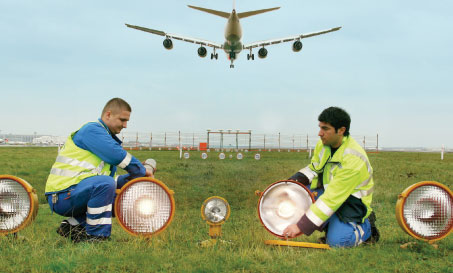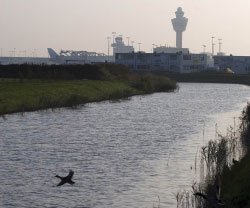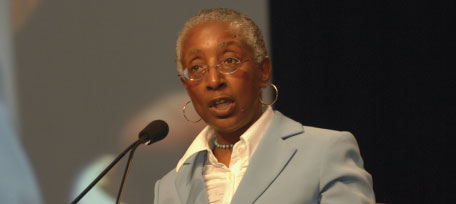
Gittens believes that a harmonised, global approach is necessary and that such a global emphasis means ICAO is more relevant now than ever. “In a global system, we need a global regulator,” she said. “I don’t see any other mechanism for providing that global set of guidelines, recommendations and studies.”
The three key areas of policy and advocacy between ACI WORLD and ICAO are safety, the environment and economic regulation. Gittens emphasised that while environmental and economic issues have been in the spotlight recently, safety is the number one priority of both ACI WORLD and ICAO. “Safety is always the main issue – we participate more on safety panels than anything else,” she said. “We spend 60% of our time on safety. We want to make sure airports are seen as the safety conscious entities that they are. Our members recognise it and that is a key element of member value for them.”
ACI WORLD participates in several groups looking at procedures for air navigation services and was recently represented on a Flight Safety Foundation group that produced a report on the risk of runway excursions – which the study proclaimed a bigger problem than runway incursions. “We have to keep our finger on the pulse and make sure impractical burdens are not imposed on airports for very little practical gain,” said Gittens.
Climate change
The climate change issue will be highly salient within the ICAO portfolio in the lead up to the fifteenth meeting of the Conference of the Parties (COP 15) of the United Nations Framework Convention on Climate Change (UNFCCC), due to take place in Copenhagen in December. ICAO held a ‘High-level Meeting on International Aviation and Climate Change’ in October, at which, significantly, ACI, IATA, the Civil Air Navigation Services Organisation (CANSO) and International Coordinating Council of Aerospace Industries Associations (ICCAIA), presented a joint paper on a global sectoral approach for aviation. “It took a lot of effort to collaborate on one industry paper,” said Gittens. “We drew the meeting to the conclusion that ICAO should push for a global sectoral approach. This is important to airports as they facilitate being in one place today and another tomorrow. Having different standards and economic measures is a burden on aviation and flies in face of where aviation is today – a major contributor to the world economy. A harmonised, global approach is necessary.”

Gittens: “Safety is always the main issue – we participate more on safety panels than anything else. We spend 60% of our time on safety.”
Such a global emphasis means ICAO is more relevant now than ever, Gittens contended. “In a global system, we need a global regulator,” she said. “I don’t see any other mechanism for providing that global set of guidelines, recommendations and studies.”
While some critics in the industry have suggested that ICAO risked losing its leadership for aviation in the context of the post-Kyoto negotiations, Gittens believes that ICAO has regained that leadership status following the High-level Meeting. “The meeting showed the strengths of a global body and, for aviation, ICAO is the right kind of body,” she said. “What will happen in the coming months, I don’t know. The industry has accepted ambitious goals. Aviation is not that big a contributor to emissions, but even with a reduction in fuel burn, the growth of aviation is such that if aviation doesn’t do something it will become a bigger contributor.”
Airport sector input
Gittens feels that ICAO’s perception of the airport sector is changing, with the airport perspective given more representation on relevant panels. “ICAO is getting that benefit of a more balanced participation, which is what it needs. As long as airports are getting their people at the table and getting their views across, that is a good thing. We’ve got to be constantly providing data, whether on the economy, safety, climate change or anything else relevant. It’s that expertise that ICAO is looking for,” said Gittens.
This month, for example, ICAO Secretary General Raymond Benjamin is framing the priorities of the organisation’s forthcoming work programme, which he will present to the Council of ICAO. Gittens explained that he is seeking industry input, so that he will be able to present a set of priorities that makes sense for the industry going forward. “It will be a specific work programme recognising that no-one can do all that’s needed. The approach is to establish certain priorities within a certain timeframe – that is the best approach to take given that everyone has limited resources,” said Gittens.

The climate change issue will be highly salient within the ICAO portfolio in the lead up to the COP 15 in Copenhagen in December.
Economic regulation
The fact that airports are businesses that are in competition with each other is a point emphasised by Gittens; very few airports in the world enjoy monopoly status. ACI WORLD would like to see ICAO less involved in economic regulation, so that the focus is on areas where there is a potential abuse of economic position. “A real thrust is to make sure that attention is placed where it needs to be placed – where there is a true monopoly position. We must recognise that airports are highly capital intensive businesses, which must take great risks and must continue to invest in down times such as now – airports cannot park a runway in the desert or maintain half a runway,” said Gittens.
Recommended practices

The fact that airports are businesses that are in competition with each other is a point emphasised by Gittens; very few airports in the world enjoy monopoly status. ACI WORLD would like to see ICAO less involved in economic regulation, so that the focus is on areas where there is a potential abuse of economic position.
ACI WORLD’s preference is to produce guidance and recommended practices rather than set specific standards. However, Gittens acknowledged that some areas do require standards; for example, a standard was recently developed for sharing data between airports and airlines. “That needs to go beyond a recommended practice because if airports and airlines don’t adhere to a standard, they won’t have that communication,” said Gittens. “But to the extent that guidance and recommended practice will work, that’s what we prefer.”
ACI WORLD encourages a global sectoral approach and ICAO’s role as a mechanism for providing a global set of guidelines and recommendations. Importantly in light of the forthcoming COP 15, following ICAO’s successful High-level Meeting in October, ACI WORLD supports it as the appropriate body for setting and administering aviation specific standards on carbon emissions.







